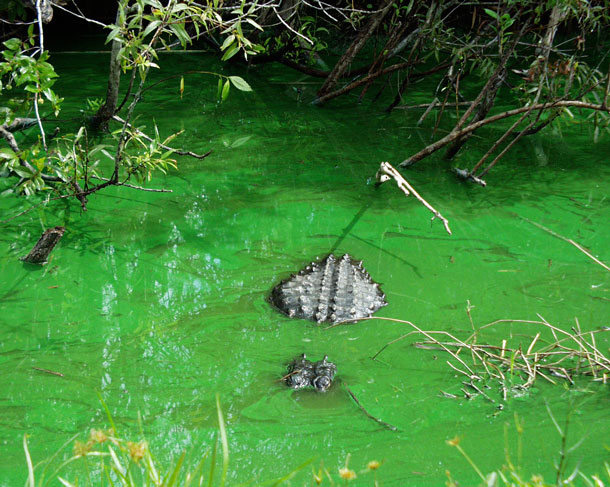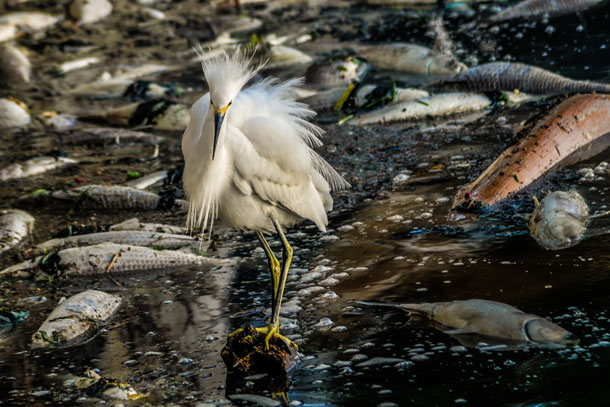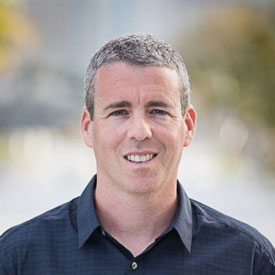Red Tide Boosts Blue Wave
Air Date: Week of October 19, 2018

An alligator peeks above the so-called “green glop,” a.k.a an algae bloom that has overtaken many of Florida’s waterways and beaches. (Photo: Caleb Slemmons, Flickr CC BY-NC 2.0)
In Florida a surge of toxic red and green algae blooms has fueled frustration with Republican Governor Rick Scott. Critics blame “Red Tide Rick,” who is running for a US Senate seat, for not doing enough to control this ecological crisis while he says his opponent, incumbent Democratic Senator Bill Nelson, is at fault. For a breakdown of how this ecological disaster is shaping Florida’s politics this November election, Host Steve Curwood spoke with Politico Reporter Michael Grunwald.
Transcript
CURWOOD: From PRI and the Jennifer and Ted Stanley Studios at the University of Massachusetts Boston this is Living on Earth. I’m Steve Curwood.
In Florida, large swaths of toxic green algae blooms and so-called “red tide” blooms have infested shore lines, killing marine life, harming humans, and stifling the tourism industry. And there’s a fourth way it could alter the future of the sunshine state, and that’s in the 2018 midterm elections. Republican governor and US senatorial candidate Rick Scott has been praised for his handling of the hurricane emergencies, but he’s being blamed by protestors for the massive algae problem. Rick Scott holds a narrow lead in most polls over his Democratic opponent, incumbent Senator Bill Nelson, but anti -algae activists could influence turnout. For a look at how the algal blooms might influence Florida politics in November, we turn to Politico Senior Reporter Michael Grunwald. Welcome to Living on Earth!
GRUNWALD: Thanks for having me.
CURWOOD: So, briefly for our listeners who just may not be up to speed on this issue. What are these red and green toxic algae blooms, and why are they impacting Florida's coastline in the first place?
GRUNWALD: Well, as you mentioned, we have two different types of algae blooms. One is this kind of neon green guacamole glop that is toxic and has been linked to cancer and various testicular problems, and then you have these sort of rust colored red tides, and that's where you've probably seen on TV the millions of fish rolling up dead on the white sand beaches of the west coast. And essentially you're talking about microorganisms that, as Rick Scott's administration is always pointing out, they are naturally occurring but they feed on nutrients, the crud that human beings put into the water, and that's what really super charges them and makes them bloom. And right now we've got a real nutrient problem and that's why you see it really taking off and destroying the tourist economy on both coasts.
CURWOOD: How important is the health and safety of Florida's waterways to its citizens?
GRUNWALD: Well, you know it's generally bad when the water that's all around us is kind of destroying our health. And remember, I mean, most of us came down here because it's nice. Florida's environment really is its economy, and it's the reason you have 20 million people living here and 100 million annual tourists visiting here is because it's a really beautiful place. And when you can't breathe at the beach, when you can't go into the water, when the sparkling estuaries that are considered the most biodiverse in North America are covered with this blanket of foul-smelling, green scum, that's not really popular.
#RedTideRick's disastrous environmental record sure is colorful. (Cartoon by @wuerker) #NotScott #FLSen pic.twitter.com/6KiAbDAme6
— Rick Scott Is Not For Florida (@NotForFlorida) September 20, 2018
CURWOOD: No, I don't think so. So, Governor Rick Scott is the Republican Senate candidate this year. Why is he bearing the brunt of the blame over these red tide blooms?
GRUNWALD: Yeah, this is a rough time for Governor Scott, or as he's now becoming known on social media they're calling him "Red Tide Rick". I mean, look I think it's partly because he's sitting in the chair, right? He's been governor for eight years and suddenly there's an ecological meltdown happening on his watch. He's also he's a Tea Party Republican, and he's described himself as the jobs-jobs-jobs governor, and part of his push for promoting Florida's economy has been dismantling some of its environmental regulations, and particularly regulations that have to do with nutrients. He actually signed a law repealing inspections of septic tanks that have been sending some of these nutrients into the waters. And he actually specifically asked the federal government for relief from nutrient standards. And he has really gutted some of the environmental agencies that we're doing enforcement and regulation of the nutrients that are in the water. So, there is a pretty plausible case that keeping nutrients out of the water has not been his top priority and that pollution right how is creating these really serious, not just environmental but economic, problems.
CURWOOD: And when you say nutrients we're really talking about things like poop, fertilizer, excesses and such like that.
GRUNWALD: Yeah, exactly we're talking about nitrogen and phosphorus. Nutrients sound great because they make things grow, right? They're nutritious. Unfortunately, they also happen to be nutritious for algae, and that's why you're seeing these super charged blooms on both coasts.
CURWOOD: You know, we talk a lot about slime in politics, but this is one of the first times that I've ever talked about it literally.
GRUNWALD: I would say, like you generally when you're a politician you don't want to be a meme, and you definitely don't want that meme to involve scum.
CURWOOD: [LAUGHS] So, to what extent are the candidates here for Senate addressing, or maybe they're not addressing, the issue of these blooms?
GRUNWALD: Well, it's been a huge issue for Senator Nelson, who of course, is saying that this is Rick Scott's pollution, that he is directly responsible. And Governor Scott has already put $20 million dollars of his own money into campaign advertisements and he's taking this head on and making this kind of circuitous this argument that actually this is Senator Nelson's fault. And his argument has to do with Lake Okeechobee and in the middle of the peninsula which is known as the kind of liquid heart of Florida, and 90 percent of it this year was covered in toxic algae...when the lake gets too high the Army Corps of Engineers has to blast that filthy water east and west into the estuaries that have had some really serious toxic algae blooms.

Thousands of fish have been killed by red tide on Florida’s gulf coast. (Photo: Susan Frazier, Flickr CC BY-NC 2.0)
And Governor Scott has argued that because the Congress has not provided enough money for fixing that dike, they have had to let the water out at an earlier time than they would have had to otherwise, and that therefore that's why it's happening and then Senator Nelson who has been in the Congress for too long hasn't done enough to get money to fix the dike. Well, of course, most people are sort of saying, like, well yeah, but the water is dirty...it's not supposed to be dirty and the state is in charge of water quality in Florida and every state.
CURWOOD: So, how much is this hurting the campaign of Rick Scott?
GRUNWALD: Well, it's definitely not helping. One of the problems he's facing is that the brunt of the toxic algal blooms are largely being felt in really staunchly Republican coastal areas. We're talking about actually around his own hometown of Naples. He actually had to cancel an event that he was supposed to do there because there were going to be so many protesters. He got chased out of a restaurant in Venice, another staunchly Republican area on the west coast. And over in Stuart on the east coast where President Trump got 66 percent of the vote, he hasn't been able to get out of his car because there's been so many protesters yelling at him about the glop in the water. So, this is a real problem for him. That's one of the reasons he's fighting back so hard with his campaign ads.
CURWOOD: So, now these protesters. Are they trolls that have been hired by the opposition, or are these folks in neighborhoods that are really upset?
GRUNWALD: No, people are really mad and you can see there's all kinds of evidence. Look, people don't like slime in their backyard. Now, do Republicans end up coming out and voting for Scott anyway just because he's a Republican or because they like what he says about taxes or because they don't like Chuck Schumer? That's certainly possible, but every election and every statewide election in Florida is close. Governor Scott won both of his races by one point. So, this is something where if the slime, if it flips a few voters or if it persuades a few voters to leave the Rick Scott space blank, that could really spell the difference between losing and winning.
CURWOOD: So, how have environmental issues featured in past elections in Florida?

Michael Grunwald is a Senior Reporter at Politico. (Photo: Courtesy of Politico)
GRUNWALD: You know, Florida is...in the last 20 years, Republicans have won the governor's race, have dominated the legislature. It's obviously a swing state, but has definitely tilted red but it has always tilted green. The story I like to tell is that Jeb Bush in 1994, when people were talking about him that he was sort of the heir apparent to his dad who was most likely going to be president some day, that was 1994, a huge Republican year, and Jeb ran as a right wing conservative. He was actually making fun of environmentalists on the campaign trail, and he turned out to be one of the only Republicans to lose that year, and his brother became the kind of heir apparent. Four years later, one of the first things he did after he lost the election was he joined the Audubon Society, and Jeb ran in 1998 as a green Republican and he won in a landslide. So, this is something where it's not always the deciding issue, but it's an issue where you don't want to be on the wrong side of, and so far in Florida that really has been lacking, and that's become a really big issue in the governor's race where you see a Democrat, Andrew Gillum, who is talking about making it a top priority and in the Senate race where Democratic incumbent Bill Nelson, who is not anybody's idea of a particularly inspiring or effective leader mobilizing action on climate change, but has been at least on the side of doing something, and Rick Scott hasn't and he's trying to make that an issue.
CURWOOD: By the way, what about climate change? As governor, Rick Scott is famous for telling agencies not to use that phrase. And yet, you guys have been horribly slashed by Hurricane Michael. Irma, down south in Florida pretty tough time last year. How does climate figure into this?
GRUNWALD: I lived until a couple years ago in South Beach and we'd have sunny days where Biscayne Bay was rising through our storm drains at high tide. Climate change is with the possible exception of Alaska, it's as tangible in Florida as it is anywhere else. Most of our state is very close to the coast. We are a peninsula jutting into the Gulf Stream, we're right in Hurricane Alley. These are all incredibly powerful motivators for Floridians to at least pay attention to climate change and that is an issue where Rick Scott has been on the other side.
CURWOOD: Um, Michael, looking ahead, what hope do you see the Florida will remain a livable and economically viable place in these coming decades given all these issues?
GRUNWALD: Well look, I'm a sort of short term pessimist and a long term optimist. I voted with my feet. I moved here. I'm raising two kids here. We're just going to have to figure out how to live more sustainably and we're going to have to take better care of the waterways that make this such an awesome place. We are just going to have to stop dumping our crap and it and what people like me have always said is that eventually Mother Nature is going to scream loud enough that we're going to have to listen, and certainly right now we're hearing that scream and we'll see if the politicians listen.
CURWOOD: Michael Grunwald's book is called "The Swamp: The Everglades, Florida and the Politics of Paradise." He's a senior reporter with Politico. Michael, thanks so much for taking the time with us today.
GRUNWALD: Thanks for having me.
CURWOOD: For the record Governor Scott did declare a state of emergency for red tide and said, “As Southwest Florida and the Tampa Bay area continues to feel the devastating impacts of red tide, we will continue taking an aggressive approach by using all available resources to help our local communities.”
Links
Politico | “How Red and Green Slime (Really) Could Swing Florida’s Senate Race”
Governor Scott Declares Red Tide Emergency
Senate Campaign website for Rick Scott
Living on Earth wants to hear from you!
Living on Earth
62 Calef Highway, Suite 212
Lee, NH 03861
Telephone: 617-287-4121
E-mail: comments@loe.org
Newsletter [Click here]
Donate to Living on Earth!
Living on Earth is an independent media program and relies entirely on contributions from listeners and institutions supporting public service. Please donate now to preserve an independent environmental voice.
NewsletterLiving on Earth offers a weekly delivery of the show's rundown to your mailbox. Sign up for our newsletter today!
 Sailors For The Sea: Be the change you want to sea.
Sailors For The Sea: Be the change you want to sea.
 The Grantham Foundation for the Protection of the Environment: Committed to protecting and improving the health of the global environment.
The Grantham Foundation for the Protection of the Environment: Committed to protecting and improving the health of the global environment.
 Contribute to Living on Earth and receive, as our gift to you, an archival print of one of Mark Seth Lender's extraordinary wildlife photographs. Follow the link to see Mark's current collection of photographs.
Contribute to Living on Earth and receive, as our gift to you, an archival print of one of Mark Seth Lender's extraordinary wildlife photographs. Follow the link to see Mark's current collection of photographs.
 Buy a signed copy of Mark Seth Lender's book Smeagull the Seagull & support Living on Earth
Buy a signed copy of Mark Seth Lender's book Smeagull the Seagull & support Living on Earth

